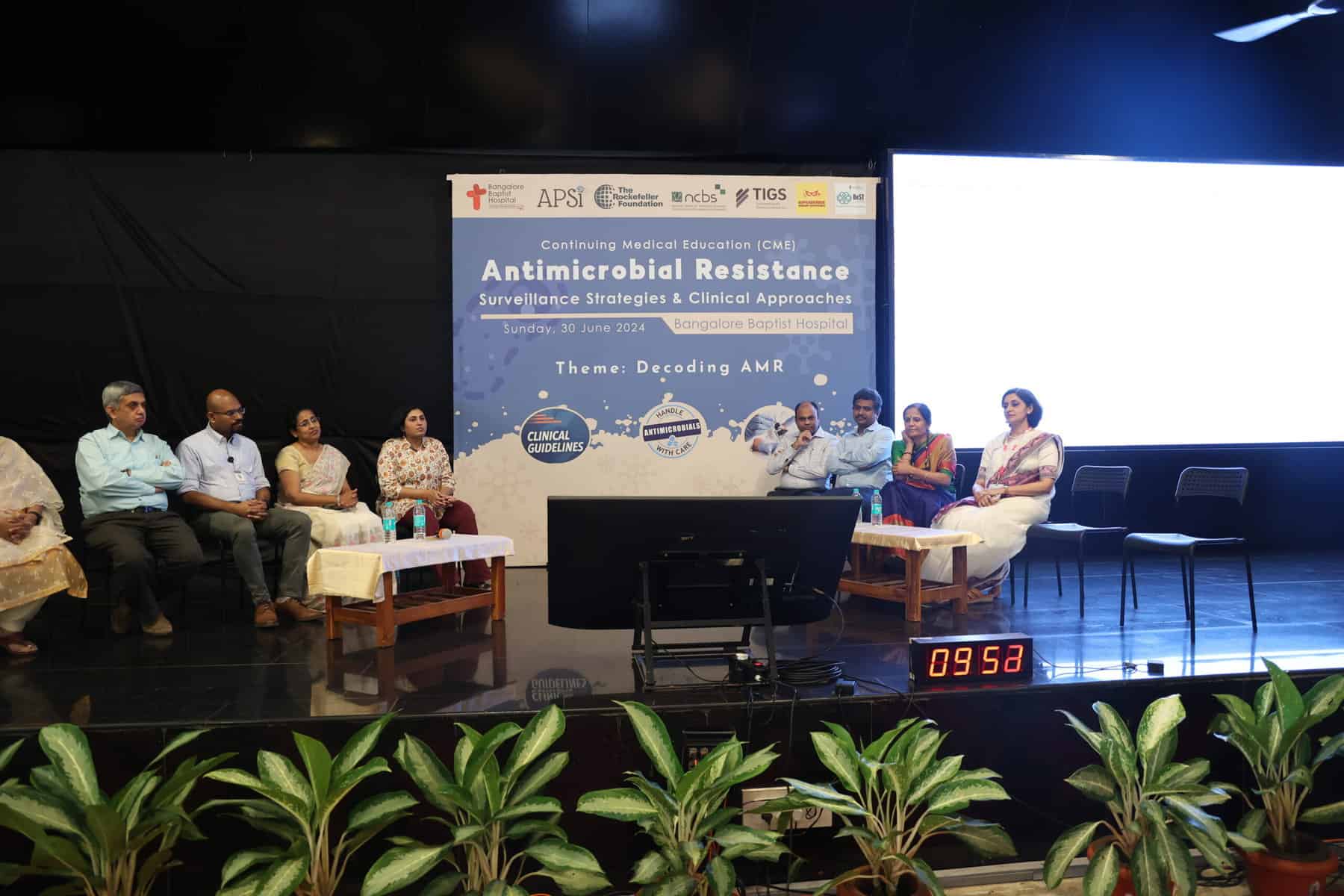The third AMR Frontline workshop for healthcare professionals was organized at Smrithi Auditorium, Bangalore Baptist Hospital, on June 30, 2024. Titled “AMR Surveillance Strategies & Clinical Approaches,” the workshop was held in partnership with the National Centre for Biological Sciences (NCBS), Tata Institute for Genetics and Society, Superheroes Against Superbugs, BeST-Bengaluru Science and Technology Cluster, World Health Organization – India, Indian Medical Association, Association of Healthcare Providers – AHPI (India), Academy of Family Physicians of India, Catholic Doctors Association, and Association of National Board Accredited Institutions (ANBAI). Over 200 clinicians joined us on a Sunday for an enriching discussion with scientists, clinicians, and government bodies, focusing on strategies and approaches to mitigate the rising threat of Antimicrobial Resistance (AMR).
The day commenced with a welcome address by Dr. Spurgeon R, Director of Bangalore Baptist Hospital, followed by a brief note by Dr. Carolin Elizabeth George, Organizing Chairperson for the event. Dr. Carolin provided the workshop’s context by introducing the organizers and explaining the motivation behind conducting this workshop on AMR as part of the Continuing Medical Education (CME) scheme for practicing clinicians.
This one-day event was structured into multiple sessions, each focusing on a specific aspect of AMR, broadly ranging from scientific research and clinical challenges across medical wards and departments to diagnostics and therapeutics, including antimicrobial stewardship programs and patient case-based discussions.
The first panel focused on the scientific research and development of environmental and clinical surveillance methods, rapid molecular biology techniques, genomic sequencing, metagenomics, etc., which briefly covered APSI’s ground efforts towards combating AMR. Several esteemed speakers shared their insights with our audience, including Dr. Rakesh Mishra (Director, TIGS), Dr. Shivranjini C. Moharir (Senior Scientist, TIGS), Dr. Farah Ishtiaq (Principal Scientist, TIGS), and Dr. Mansi Malik (Research Scientist, TIGS). Representing the Karnataka State Government, Dr. Ansar Ahmed from the State Surveillance Unit, Integrated Disease Surveillance Program (IDSP), Arogya Soudha, also joined the gathering and shared information about the Karnataka State Surveillance programs under the NCDC vision.
The second panel highlighted the challenges faced by healthcare professionals in clinical settings and their experiences working with patients suffering from infections caused by drug-resistant pathogens. The clinicians shared practical insights on a varied spectrum of cases, such as approaching MDR infections in adults, antibiotic use in immunocompromised patients, antibiotic-resistant urinary tract infections during pregnancy, approaches to antibiotic resistance in patients with diabetic foot, and addressing the persistent issue of antibiotic overuse in outpatient settings, emphasizing the role of primary physicians. During this segment, talks were delivered by Dr. Prasanna Kumar (Assistant Professor, Department of Infectious Diseases, CMC Vellore), Dr. Indira Menon (Head, Critical Care, BBH), Dr. Sudha Jasmine (Professor, Department of Internal Medicine and Obstetric Medicine, CMC Vellore), Dr. Emmanuel Lazarus (Associate Professor, General Surgery, CMC Vellore), and Dr. Srividhya Raghavendran (Head, Family Medicine, BBH).
The organizing committee then engaged the audience in two exciting games: an AMR Crossword and another called Four Pictures and One Word, where participants were asked to compete in teams and guess the AMR-related term within one minute through a clue of four pictures displayed on the screen.
After lunch, the participants gathered back in the auditorium for the discussions during the third panel, which focused on Diagnostics and Therapeutics. The discussions ranged from understanding antibiotic susceptibility testing and interpretation of AMR diagnostics to a review of current antibiotic guidelines and their applications in clinical settings, along with experiential insights based on studying antibiograms and antibiotic stewardship in a tertiary care setting.
Proceeding with the workshop agenda, a series of five case-based discussions was moderated by clinicians from different categories, including Obstetrics and Gynaecology, Family Medicine, General Medicine, Surgery, and Critical Care. The clinicians presented patient cases and posed questions to a panel of over twelve practicing clinicians.
The event concluded with an interactive discussion focused on a long-term approach to solving Bengaluru city’s AMR problems by initiating a joint conversation about workshops and outreach between multiple stakeholders. Panelists included Dr. Anuj Sharma, Technical Focal Point for AMR, Labs and IPC at WHO Country Office of India; Dr. Rakesh Mishra, Director, TIGS; APSI researchers and Dr. Carolin Elizabeth; moderated by Dr. Sufia Sadaf.
